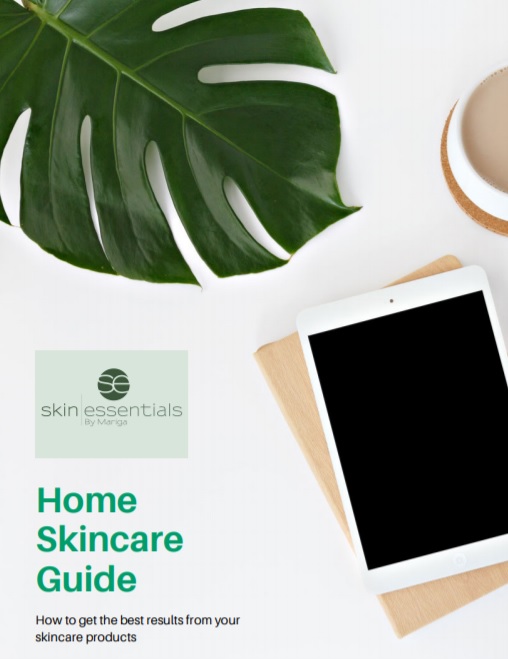We are delighted with the latest press coverage for Skin Essentials by Mariga. It was a real pleasure to chat with such a well-informed and savvy beauty journalist. Rachel Marie White of the Irish Examiner really knows her skincare and we talked non-stop about all things skin.
We have had great feedback and a lot of new enquiries since the full-page piece featuring Mariga’s top skincare advice was published last Saturday.
If you missed it, here is the link to the online version:
Full text here:
Mariga Sheedy is the founder of Wexford skin clinic Skin Essentials by Mariga, and has developed a range of professional and at-home skincare under the same name.
Over 25 years of beauty experience, including positions in national and EU industry bodies, have made her a dream skincare guru. In a business fond of quick fixes and brand-funded studies, she takes a long-term, cause-first approach to each client’s care.
Her assessments and treatments are based on independent research by dermatology superstars like Dr Albert Kligman and Dr Peter T Pugliese. Skin Essentials by Mariga products are entirely comprised of high-quality ingredients with well-established benefits. I’m a fan of Sheedy’s writing and v-logs on what really works, and was quite keen to ask her what doesn’t.
Easy on the exfoliants
“Over-processing is one of the most common problems I treat, and over-exfoliation in particular. It really began when microdermabrasion became fashionable about ten years ago. If you have a strong chemical peel or a microdermabrasion session you get a beautiful polished result initially. The impulse to keep chasing that is understandable but very unhealthy for skin in the long term, so we try to reeducate clients. Constantly stripping of the skin’s natural defence layer (the acid mantle) will weaken the health of the skin over time, resulting in premature ageing. Exfoliants should be used with caution. If you have a Vitamin A product in your home care, for example, it provides a minute amount of cell renewal each day. This is really all the exfoliation normal skin needs. A fruit enzyme very gently exfoliates skin with low or no tolerance for Vitamin A. I recommend a pumpkin enzyme that is very well tolerated, like my Enzyme Exfoliator, €38.”
Fragrance isn’t skincare
“Your skin doesn’t recognise fragrance, so perfumed products will always trigger an inflammatory defensive response. Anything that’s not native to skin will trigger that response. Obviously we can’t source skincare ingredients from human sources to put into our skin cells, so we look for bio-identical substances in the marine and plant worlds. Fragrance will never be bio-identical.”
You don’t need a separate eye cream.
“The skin around your eyes is just slightly thinner, it has the same cells with all the same requirements as those on the rest of your face. Treat them the same and don’t forget to apply SPF. I’ve never used an eye cream or recommended one to my clients. There is nothing that a topical product, no matter the quality, can do for puffy eyes or dark circles. Those issues are either hereditary or medical issues. I find it so unscrupulous that marketing should target people who feel vulnerable about them.”
You shouldn’t need a makeup primer.
“I prefer to treat the cause of a skincare problem rather than concealing the symptom. If skin is balanced, you will not need a primer and makeup should retain its lovely finish. Our Hydra-Collagen Serum, €64, which is rich in bio-fermented sea kelp, creates a nice makeup base, but that’s just a happy coincidence. Also, if you have dry skin issues, repeated exposure to silicones [the prevalent ingredients in most primers] can make them worse. Makeup will start to patch.”
Mariga Sheedy
If you use sunbeds, we won’t treat you.
“There would be no point, we’d be wasting our time and your money. Similarly, if you aren’t protecting your skin with a broad-spectrum SPF product daily, there is little point in spending money on antioxidant serum.”
There is no cure-all antioxidant.
“Like water and sun protection, antioxidants are vital for keeping skin healthy. They repair damage that has been done and fight damage that is being done. We have to use a cocktail of them because each kind works differently and there is also a range of different free radicals we seek to target. Vitamin C, for example, is very important for healthy cell renewal, especially the body doesn’t make or store it, but — just as one can’t live on oranges alone — it needs some backup. Vitamin A is a little superhero of an ingredient, in terms of providing building blocks for skin cells. Vitamin E, green tea extract and superoxide dismutase are all very important. I try to keep my products’ ingredient edit quite tight (no silicones used as cheap filler), and to choose extracts with multiple benefits. The skin is a living, breathing organ carrying out processes and needs many different types of fuel to do it.”
‘Combination’ and ‘sensitive’ skin are marketing terms.
“Leaving medical issues aside, there are only three skin types you can be born with. Dry types have fewer oil glands than average, while oily types have more. Irish skin also tends to be predisposed to diffused redness. If your skin is suddenly different in one area, it is an issue that needs correction rather than a distinct ‘type’. Skin is supposed to be sensitive, but what’s typically called sensitive skin is actually sensitised skin. This flares up as a result of environment or because of something you’ve eaten, used or done, so it’s worth taking stock of your diet and skincare when this happens.”
Dry skin needs both water and oil.
“Dry is my own skin type and the predominant type I treat. It is important for people with dry skin to seek professional advice on whether they lack oil, water or both. The two work in harmony to create healthy skin. If they are out of whack, your skin will find it difficult to retain moisture or protect against environmental irritants. I’m a big fan of oil cleansers, as long as they’re free from essential oils, for the daily care of this skin type. I use my Skin Comfort Cleanser, €25. I like dry-skin moisturisers that are rich in natural oils and contain very few silicones. Silicones aren’t harmful but they have large molecules that decrease the bio-availability of great anti-ageing ingredients like peptides. These actives won’t be able to penetrate a thick, silicone-rich cream to get to your skin. If you use a natural oil-based moisturiser, like my Hydrating Cream with Hyaluronic Acid, €37, they’re far more effective.”



Stay Updated